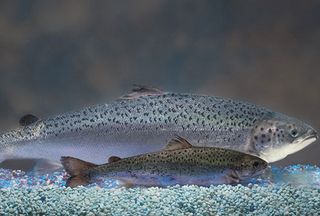'Frankenfish on the Menu? FDA Gives Initial Approval

Genetically modified Atlantic salmon — known by critics as "Frankenfish" — may soon be available in your local grocer's seafood aisle. The Food and Drug Administration has given initial approval to the biotech developers of the salmon, clearing the last big hurdle before consumers can purchase the fish.
But consumers won't know if the salmon they're buying is genetically engineered or not — U.S. regulations don't require food made from a genetically modified organism (GMO) to be labeled. That fact, plus the impact the engineered salmon could have on wild salmon stocks, human health and the fishing industry, has critics raising a stink with the FDA, according to the Huffington Post.
The Atlantic salmon developed by Massachusetts-based AquaBounty was genetically modified using DNA material from a Chinook salmon and an eel-like species called an ocean pout. These genes cause the fish to grow twice as fast as wild salmon, according to the British newspaper The Telegraph, making production of the fish far more cost effective.
Though many other GMO foods are now available — from papaya engineered to resist the ringspot virus to canola plants that can withstand weed-killing herbicides — the FDA's approval marks the first time a genetically engineered animal product would be available anywhere in the world.
The FDA's approval last week is followed by a 60-day period for public commentary on the engineered salmon: After the comments are reviewed, the agency can issue its final approval in early 2013.
Opponents of GMO foods fear the salmon — marketed as the AquAdvantage salmon — could escape into the wild and undermine the genetics of wild Atlantic salmon. Other critics question its potential impact on human health (including allergic reactions to eating the fish) and raise ethical issues whenever scientists tinker with the genetic code of animals.
But officials at AquaBounty stress that only sterile females would be raised on inland fish farms, rendering concerns about breeding with wild fish stocks moot. Additionally, because the GMO salmon are faster and easier to raise and distribute, their production would have a smaller carbon footprint and a net environmental benefit.
Sign up for the Live Science daily newsletter now
Get the world’s most fascinating discoveries delivered straight to your inbox.
Follow LiveScience on Twitter @livescience. We're also on Facebook & Google+.

Most Popular


